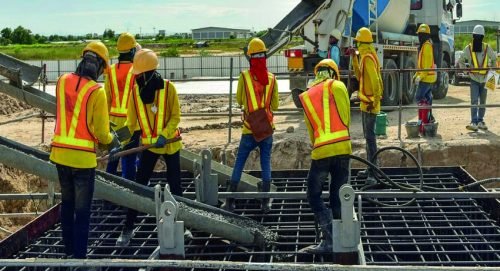As Malta’s economy has grown in complexity and scale, so too have the demands on its workforce. Nowhere is this more evident than in the property development, construction, and real estate sectors—industries that have long been central to the country’s economic narrative. For developers, contractors, investors, and the professionals who give shape to the built environment, reliable access to skilled labour is not a peripheral issue. It is a prerequisite for progress.
TThe Malta Development Association (MDA) is the voice of Malta’s private real estate and construction sectors. Its membership spans the island’s largest developers, estate agents, contractors, and allied trades, reflecting a broad spectrum of economic stakeholders. From housing developments and civil infrastructure to commercial centres and office space, MDA members shape the physical, economic, and social fabric of Malta. As such, the Association is acutely aware of the role that foreign labour plays in keeping the industry moving.
The MDA has thus undertaken its Review of the Malta Labour Migration Policy Consultation Document. In what is arguably one of the Association’s most consequential contributions in recent years, this paper offers a comprehensive, practical, and solutions-driven critique of the proposed reforms to Malta’s labour migration system. It is not simply a list of objections or lobbying points. It is a vision for how migration policy can be fair, sustainable, and aligned with the real needs of a rapidly evolving economy.
Its consultation document has drawn upon this deep pool of practical knowledge. It reflects conversations with developers who are struggling to maintain momentum on multi-million-euro projects due to labour shortages. It echoes the concerns of construction firms navigating opaque bureaucracy and inconsistent permit renewals.
The document amplifies the voices of contractors and estate agents who understand first-hand the need for stable, predictable access to workers in order to meet market demand.
“this paper offers a comprehensive, practical, and solutions-driven critique of the proposed reforms to Malta’s labour migration system”
Meeting economic reality
At the core of the MDA’s review is a simple yet powerful assertion: Malta’s migration policy must reflect economic realities. While it agrees that regulation is needed to ensure fair treatment and proper integration of foreign workers, the Association warns that overly rigid or punitive measures could have the opposite effect—choking economic growth, discouraging talent, and creating costly delays for major developments. For example, the Association expresses serious concern over proposed termination rate thresholds that could penalise businesses in high-turnover industries such as construction and hospitality.

It argues that these sectors naturally experience workforce mobility and they should neither be stigmatised nor restricted on that basis.
Similarly, the MDA highlights the dangers of arbitrary quotas and fixed salary thresholds, particularly when it comes to micro, small and medium-sized operators; who may struggle to absorb rising costs or sudden administrative changes which they would perforce experience during such happenings.
In each case, the Association’s position is clear: while compliance is essential, policies should incentivise good practice, not punish natural market dynamics. Instead of punishing firms for turnover, the government should reward those that invest in retention and stability.
Administrative Bottlenecks and Practical Barriers
Another significant area of concern is Malta’s bureaucratic and administrative framework for work permits and renewals. According to the MDA, the system is already struggling with delays and inefficiencies. Adding layers of new regulation – especially if unclear or inconsistently applied – risks turning labour mobility into a quagmire.
The Association calls for faster permit processing, automatic extensions for delayed renewals, and clearer documentation standards for compliance audits. It also points out the inadequacy of the current recruitment system via Jobsplus, where employers routinely report receiving applications from candidates who are clearly unsuitable for the role.
This creates inefficiencies and delays that harm both businesses and workers.
“the MDA highlights the dangers of arbitrary quotas and fixed salary thresholds”

On the subject of integration, the MDA supports cultural orientation and skills development for foreign workers. However, it warns against overloading these initiatives with duplicative requirements or unclear timelines. For example, while agreeing in principle with pre-arrival integration courses, it urges the authorities to clarify how these overlap with the existing Skills Pass programme, and to ensure affordability, accessibility, and availability of courses before mandating them.

A Reward-Based Approach
Among the more transformative suggestions in the MDA’s paper is a shift in regulatory philosophy. Rather than adopting a punitive stance toward employers, the Association proposes a reward-based system that recognises firms demonstrating good faith and long-term commitment to their workers. For example, companies with proven retention records could benefit from longer permit renewal periods, lower fees, or streamlined documentation requirements.
“By incentivising positive behaviour rather than simply policing infractions, the government could build a more stable, resilient labour market”
This approach, the MDA argues, would not only enhance regulatory compliance but would also contribute to a culture of mutual trust. It would reinforce responsible hiring while avoiding the alienation and resentment that punitive models often produce. By instigating positive behaviour rather than simply policing infractions, the government could build a more stable, resilient labour market.
A Call for Nuance Contextual Flexibility
 photo: stock image
photo: stock image
Since statistics tend to generalise the earning potential of a large swathe of the construction workforce: the self employed professional, they may give rise to a mistaken belief that construction wages are uniformly low.
Throughout the consultation paper, the MDA consistently returns to the need for context.
It urges policymakers to differentiate between industries and avoid a one-size-fits-all approach. Construction, for instance, faces unique challenges: intense seasonality, complex timelines, reliance on subcontractors, and site-specific labour needs. The same metrics used to assess performance or turnover in retail or finance may be inappropriate or even misleading in the context of building sites.
“One of the more technical but crucial interventions made by the MDA concerns wage data and how it is interpreted”
Similarly, the Association cautions against applying blanket rules. Newly registered companies or startups – whether in construction, real estate, or hospitality – may face different growth curves and labour demands than established firms. Imposing hiring limits or qualification thresholds based on arbitrary criteria could stifle innovation and discourage new market entrants.
The MDA also highlights the need for clearer legal frameworks when dealing with sensitive issues such as redundancies, work permit suspensions, and appeals. It advocates for fairness, transparency, and consistency – especially in cases where the livelihoods of foreign workers and the operational continuity of businesses are at stake.
Data, Definitions, and the Labour Force Survey
One of the more technical but crucial interventions made by the MDA concerns wage data and how it is interpreted. The Association notes that much of the publicly available data on construction wages is skewed, in part because it does not adequately account for self-employed workers.
“The MDA’s paper also devotes attention to the treatment of Third-Country Nationals (TCNs), who now make up a significant portion of Malta’s labour force.”
These professionals often earn significantly more than available statistics suggest, leading to the false impression that wages in construction are uniformly low.
To correct this, the MDA recommends that policymakers rely on more representative data sets – such as the Labour Force Survey – which provides a more complete picture of actual earnings and employment trends. Informed decisions, the paper argues, can only be made when based on accurate information.
TCNs, Permits, and Policy Levers
The MDA’s paper also devotes attention to the treatment of Third-Country Nationals (TCNs), who now make up a significant portion of Malta’s labour force. While acknowledging the need for oversight and safeguards, the Association argues for more flexibility and clarity in TCN permit rules – especially regarding renewals, job transitions, and the legal status of visa-exempt individuals.
It proposes that interim permits be granted while applications are pending, so as to avoid disruptions and costly gaps in employment. It also recommends longer grace periods for TCNs who lose their jobs, as well as streamlined permit transfers for workers changing employers.
The MDA is critical of proposals that would force foreign workers to leave Malta while awaiting new permits. Not only does this create unnecessary hardship for workers, it also places an administrative and financial burden on employers. A more sensible approach, the Association suggests, would be to allow for in-country processing, subject to appropriate checks and conditions.
photo: stock image of a worker analysing blueprints digitallys.
A Strategic Policy
Ultimately, the MDA frames its paper as a call for strategic thinking. Labour migration is not a minor policy area – it is central to Malta’s economic future. The Association urges the government to view the new migration policy not as a set of reactive measures but as a long-term framework aligned with Envision 2050, Malta’s broader socio-economic roadmap.
This includes acknowledging the need for a more integrated system of upskilling, retention, and social cohesion. It also means ensuring that employment policies in the public sector do not undermine private sector needs – particularly in low-skilled labour markets where competition for Maltese workers is already high. Above all, the MDA argues for partnership: between government and employers, between regulators and industries, and between Malta and the foreign workers who now play such a vital role in its success.
Conclusion: A Constructive Blueprint for a Better Future
Labour migration will remain one of Malta’s defining challenges – and opportunities – in the decades to come. With demographic pressures mounting and economic complexity increasing, the country must get this policy right. And that means not just listening to stakeholder voices, but acting on them
The Malta Development Association’s consultation paper is not an act of defiance, but a document of collaboration. It lays out, clearly and constructively, how Malta’s labour migration policy can be made to work – not just for government or business, but for the entire country.
In doing so, it serves as both a blueprint and a benchmark: a reminder that when regulation is shaped by those who build the nation’s homes, offices, schools, and hospitals, it is more likely to succeed. For Malta’s property and construction sectors – and for all those who live in the spaces they help create – that success cannot come soon enough.
“The MDA argues for partnership: between government and employers between regulators and industries, and between Malta and the foreign workers who now play such a vital role in its success”



Comment